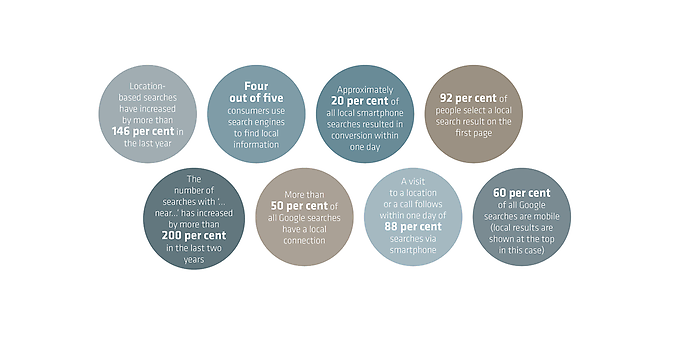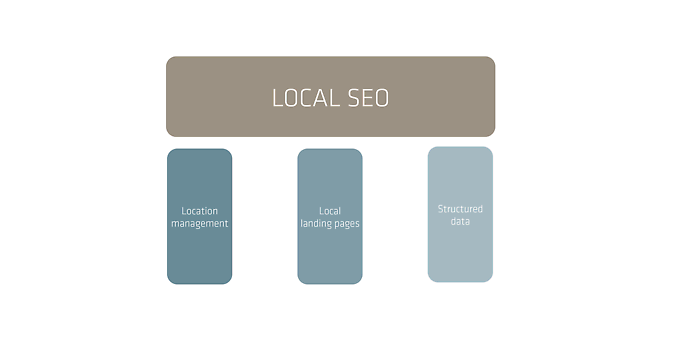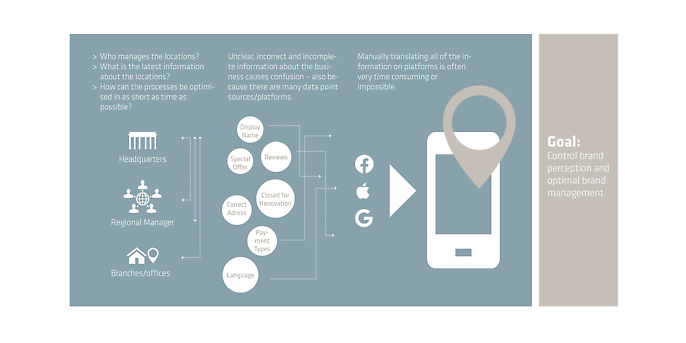15. April 2021 By Phillipp Jansegers
Local search engine optimisation (local SEO): the benefits for businesses during the pandemic
We have been struggling with a whole host of different challenges since the coronavirus (Covid-19) took hold of the world and virtually shut down many areas of life. Will restrictions be relaxed soon? How exactly will they be relaxed? Will my business be able to reopen its doors? How long will the current regulations in my region actually apply for?
The latest incidence rates mean that something can change in terms of whether industries can open up or have to close down again on an almost daily basis. But how do I as a business let my customers, guests and potential clients know that I can open up or suddenly have to close my shop again and what conditions will they have to fulfil to be able to come onsite or make a purchase?
Frustrated customers are a major nuisance for businesses, which means they should be asking themselves two key questions: what leads to customers becoming frustrated and how can it be avoided? The first thing to do here is to put yourself in the customer’s shoes and understand which points of contact and interfaces they might have with the business and its location(s). For instance, in most cases, customers use Google or other search engines to search for businesses and find information such as their contact information or opening hours.
Statistics reveal, among other things, that the number of searches on smartphones and location-based searches are steadily increasing – with local search results being displayed at the top, often via Google Maps.
The customer is told that the business is ‘open’, so they go to the shop or location, only to be confronted with a locked door. The result is that they’re annoyed and, at worst, the business has one (potential) customer fewer.

This brings us back to the original question of how businesses can avoid this kind of problem before it happens. Wouldn’t it be nice, and not to mention practical, if they could easily communicate changes regarding opening hours, accessibility and on-site requirements across platforms and directories in real-time updates, reaching and addressing their target group directly in the process? The following checklist of important measures for Google Maps locations is designed to help businesses keep their customers informed of their current status. These measures can be implemented via the Google Maps management platform ‘Google My Business’.
Optimisation measures for businesses in Google Maps (not just for during pandemics...)
- Locations can be marked as temporarily closed
- More hours can be specified for certain services or business types
- The Special opening hours section allows businesses to mark their locations as closed on certain days – such as bank holidays – but also to mark any number of days with the note ‘open from... to...’. This is an ideal solution if a location offers ‘Click and Meet’ three days a week, for example.
- Covid-19 updates can be published by businesses free of charge – Google makes sure that these posts are given high priority. This results in the post being highly visible and the business location receives more attention. Businesses also receive additional traffic, or in other words, potentially more visitors and new customers, as they can add a link to their website in these posts via a button (with the text ‘More information’, for example).
- Other types of posts (event, offer, news) also generate more attention for the business in the (local) Google search. Products can also be placed within a Google Maps location free of charge. They are all designed to give (potential) customers all of the information they need and achieve the best possible presence and attention in the search results.
- Maintaining attributes enables businesses to inform their customers, guests and visitors about the latest special requirements. Google provides individual attributes in the ‘Safety and Health’ and ‘Service Options’ sections – businesses can then activate them with one click.
To make your business as easy to find by locals as possible, we generally recommend keeping your business profile fully up to date. This also includes the following, on top of the points covered above:
- Business categories
- Service area(s)
- Website
- Links for appointments
- Services and products
- Description of the company
- Opening date at the respective location
- Photos (recommendation: minimum three photos per category and upload new photos regularly)
Here are three more tips to help you keep your locations up to date in Google Maps:
1. Record statistics: Every Google Maps business profile includes statistics – on views, search and user activity, for example. You should record these before you optimise your profile for the first time, and then record them at regular intervals so you can interpret the progress and findings from the optimisations.
2. Always respond to reviews.
3. Businesses should always answer questions posted by users – bonus tip: if mapping keywords using a holistic SEO concept has revealed which questions users are asking for categories, services and products relevant to your business, you can also ask and answer these questions yourself. You can read more on this in the section on our partner ‘Uberall’.
Background: what does local SEO mean and what does it cover?
In this article, we jumped right into the topic and talked about local SEO during a pandemic. But what exactly does it actually cover and what does it actually mean? Search engines also have an index for local businesses. Various optimisation measures help businesses influence and improve how they are found and listed in local searches. Search engines such as Google recognise local references in the searches and display relevant results that are nearby accordingly. When we talk about local SEO, this includes three sub-areas:

The area of ‘Google Maps/Google My Business’ we discussed at the beginning of this article is in principle only a small building block within the first pillar – ‘Location management’. This is in no way meant to diminish its relevance – rather, it’s at least equally important that you don’t neglect the other supporting pillars. For instance, every business website should have its own sub-page for each location, which contains all of the (important) information about the location, is optimised for SEO based on the most important keywords and contains the same contact information as the other pages. But in this article, we’re focusing our attention on location management.
Why focusing on Google alone is not enough...
A common argument we hear from customers when it comes to local search engine optimisation (local SEO) is that almost everyone uses Google anyway – so it’s enough for us if we just concentrate on that. The two key points below and the explanations of them that follow refute this argument and demonstrate why no business can afford to focus exclusively on Google:
- 1. Providing the best brand experience possible
- 2. Retaining maximum control of brand perception
No matter how large or small a business is and the number of locations it has, the goal should always be to be present where the customer is looking and to provide them information about the business in the most effective way possible. For example, the large number of iPhone users means that Apple Maps is often used and the navigation systems installed in vehicles shouldn’t be forgotten either. What company can afford to do without (potential) customers or not provide them with enough information? Seeing as manually keeping locations up to date across the numerous directories requires a lot of time and effort, adesso recommends ‘Uberall’, a partner that has established itself on the market as the leading German provider for digital location management.
The second point is intended to illustrate that there are often entries for businesses in directories/the yellow pages that they know nothing about. These often also list outdated information and equally old website links for the business. As a business, do you want to simply hand over this level control over your brand and identity to external service providers such as Google or the yellow pages?
Another related topic is the ‘magic word’ à citation – one of the ranking factors in local SEO. Google sees links to a business’ website as referrals just as it does a mere mention of the business. The more (qualitative) mentions and links a business and its website have, the higher its ‘reputation’ with Google. Even though this is only one of several factors, it shouldn’t be overlooked, but rather given an even greater focus.
Location management challenges and benefits with Uberall
This overview gives you a clear picture of the challenges involved with location management:

We have been working with Uberall for a few years now and – due to the pandemic – have only recently discovered the benefits of the tool and would like to elaborate on these a little by using an example. One of my clients has an online shop and 11 locations in Germany. The incidence rates in cities and municipalities are fluctuating day by day, meaning that the accessibility, opening hours and requirements in shops change several times a week. Just imagine having to change this information manually in every conceivable place on the Internet – by the time you’re done, the information will have changed again, meaning all your efforts were for nothing.
Maintaining business information with Uberall, on the other hand, entails real-time data synchronisation across 125 directories, platforms and navigation devices, ensuring that all of your data is always up to date in all of the relevant places. Plus, there is also an overview of all reviews and the attention-grabbing posts and articles can be published across platforms to make sure your clientele is always up to date and save time in the process.
We have summarised the most important benefits of the Uberall tool below:
- Reach up to 95% of users on all channels
- Present an optimal brand experience at all relevant touchpoints (thanks to a uniform, optimised brand presence)
- Ensure targeted distribution of all important information in over 125 international directories, navigation devices and platforms.
- The most important ranking factors in local SEO, such as citation building, are covered
- Your link portfolio is strengthened – a positive for the website itself and also for the local level
- All site-relevant data is maintained and optimised across directories (avoids duplicates)
- Review management is fast and efficient thanks to active moderation of comments and reviews
- Standardised processes (such as for maintenance or posts on social media) save a lot of time
A partnership with Uberall can also include:
- ‘Locator + Pages’ à Location search and location sub-pages integrated into your website that fulfil all common SEO criteria and are optimised accordingly.
- ‘Advanced Analytics’ à Provides a detailed overview of the most important statistics and data on your business entries and the respective (location) accesses.
The fact that ‘Locator + Pages’ also covers the two pillars of ‘structured data’ and ‘local landing pages’ makes Uberall an ideal holistic local SEO solution to ensure your business is in the best position it can be when it comes to local SEO. Especially in the current situation, businesses can be found at all of the relevant interfaces in the best possible way and provide (potential) customers there with full information and details regarding the latest changes.
Last but not least: adesso customers benefit from the partnership with Uberall in a number of ways – feel free to contact us about this.
Conclusion
A focus on local search engine optimisation is more worthwhile than ever these days as the use of smartphones is steadily increasing, as are location-based searches. The constant changes regarding current availability and opening hours and the exciting possibilities of Google Maps as well as cross-platform and cross-directory customer communication (via Uberall) should not be neglected by companies if they don’t want to annoy their customers and always want to keep them up to date.
If you would like to learn more about exciting topics from the world of adesso, then check out our latest blog posts.

